Unit 6 I'm watching TV Section A (2d-3c) 课件(共30张PPT)
文档属性
| 名称 | Unit 6 I'm watching TV Section A (2d-3c) 课件(共30张PPT) |
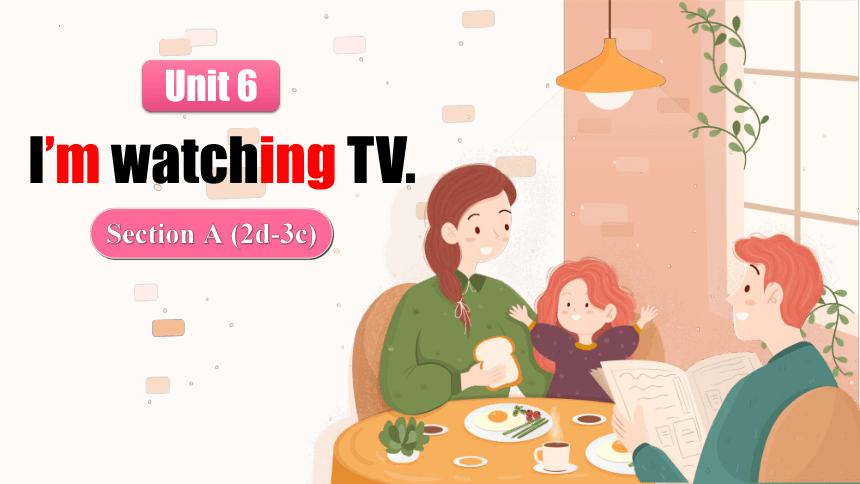
|
|
| 格式 | pptx | ||
| 文件大小 | 39.5MB | ||
| 资源类型 | 教案 | ||
| 版本资源 | 人教新目标(Go for it)版 | ||
| 科目 | 英语 | ||
| 更新时间 | 2024-03-01 00:00:00 | ||
图片预览

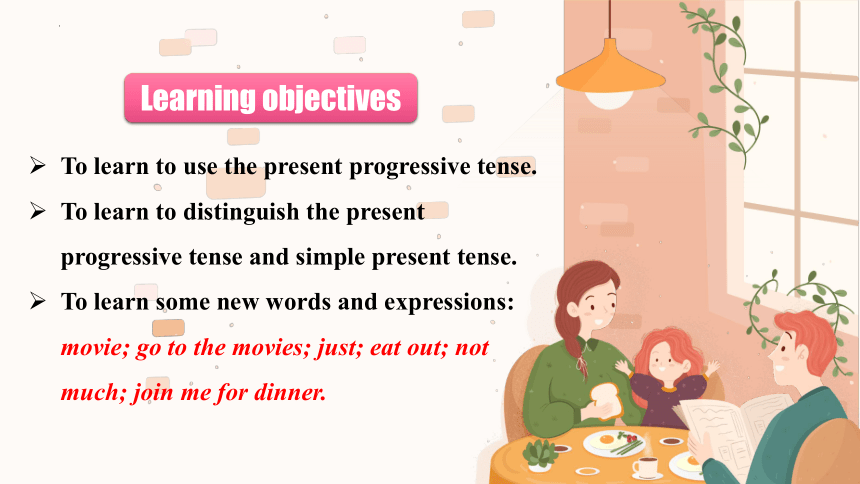
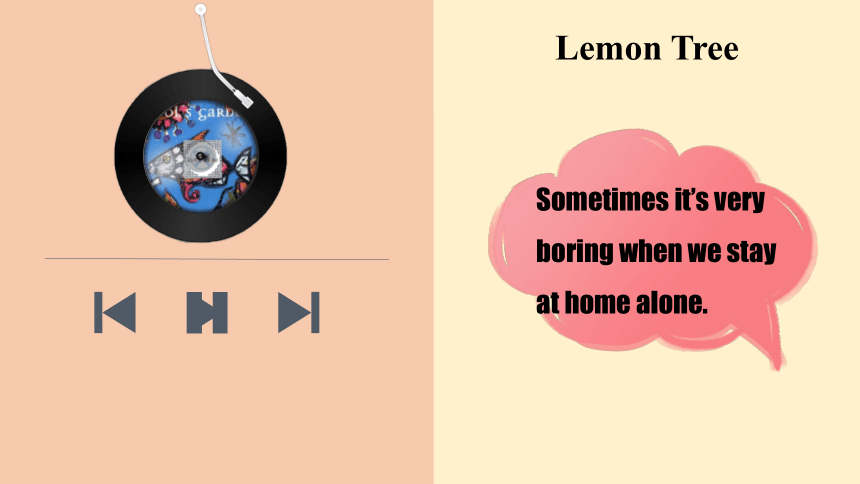
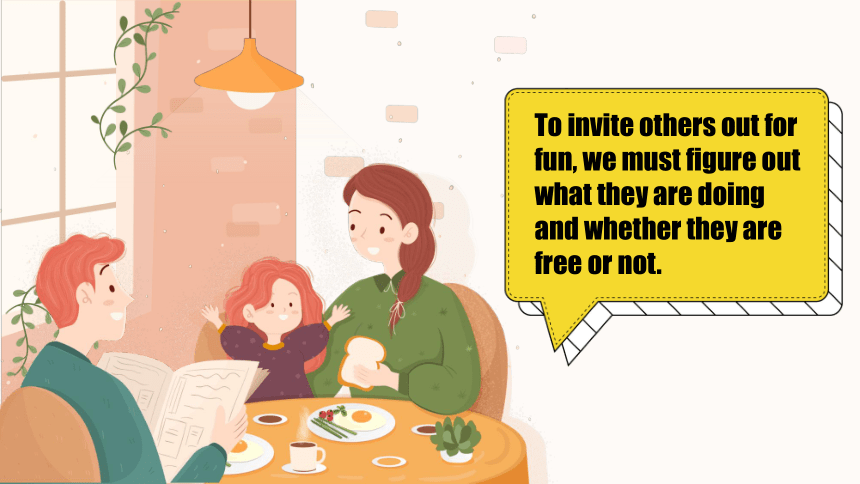
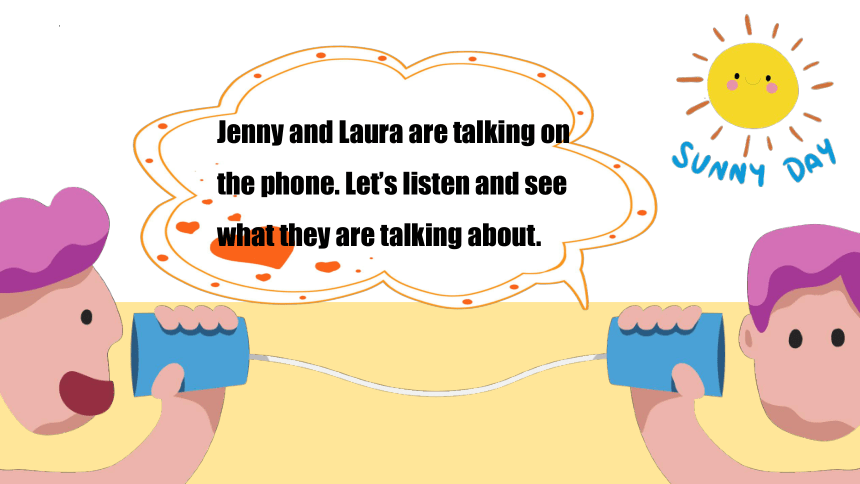
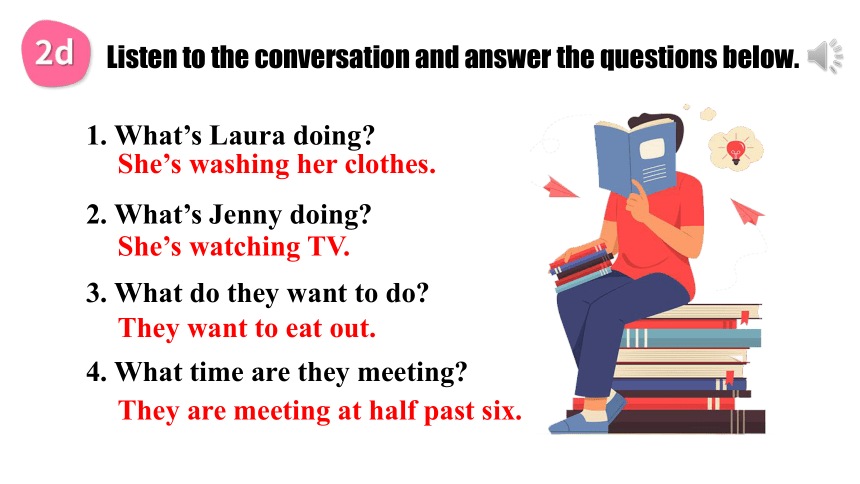
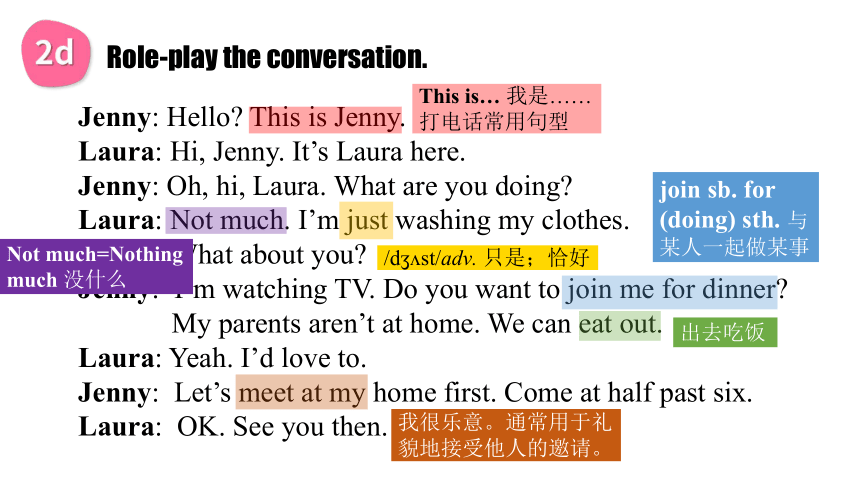

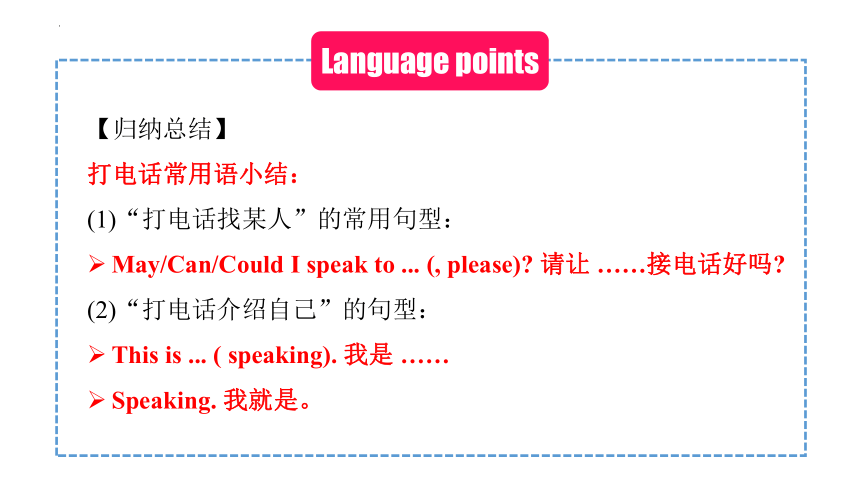
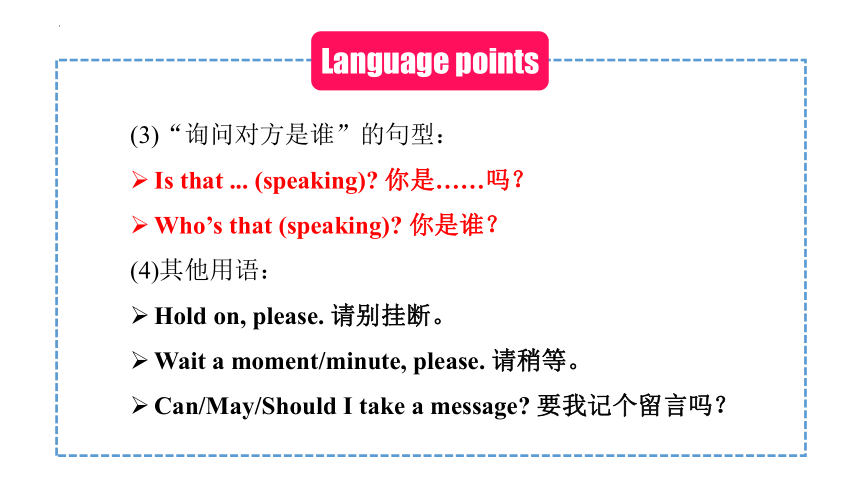


文档简介
(共30张PPT)
By Yushen
Section A (2d-3c)
I’m watching TV.
Unit 6
By Yushen
Learning objectives
To learn to use the present progressive tense.
To learn to distinguish the present progressive tense and simple present tense.
To learn some new words and expressions: movie; go to the movies; just; eat out; not much; join me for dinner.
I'm sitting here in the boring room
It's just another rainy Sunday afternoon
I'm wasting my time I got nothing to do
I'm hanging around I'm waiting for you
But nothing ever happens and I wonder
Lemon Tree
Sometimes it’s very boring when we stay at home alone.
By Yushen
To invite others out for fun, we must figure out what they are doing and whether they are free or not.
By Yushen
Jenny and Laura are talking on the phone. Let’s listen and see what they are talking about.
By Yushen
Listen to the conversation and answer the questions below.
1. What’s Laura doing
2. What’s Jenny doing
3. What do they want to do
4. What time are they meeting
They are meeting at half past six.
She’s washing her clothes.
She’s watching TV.
They want to eat out.
By Yushen
Role-play the conversation.
Jenny: Hello This is Jenny.
Laura: Hi, Jenny. It’s Laura here.
Jenny: Oh, hi, Laura. What are you doing
Laura: Not much. I’m just washing my clothes.
What about you
Jenny: I’m watching TV. Do you want to join me for dinner
My parents aren’t at home. We can eat out.
Laura: Yeah. I’d love to.
Jenny: Let’s meet at my home e at half past six.
Laura: OK. See you then.
This is… 我是…… 打电话常用句型
Not much=Nothing much 没什么
/d st/adv. 只是;恰好
join sb. for (doing) sth. 与某人一起做某事
出去吃饭
我很乐意。通常用于礼貌地接受他人的邀请。
Language points
打电话常用语
1. Hello This is Jenny. 喂?我是珍妮。
【用法详解】“This is ... ”是打电话时介绍自己的常用句型,意为“我是 ......”。打电话时,一般用 this 代表“我” ,用that代表“对方”,而不用 I 和 you。询问对方是谁用“ Who’s that ”。
你好,我是凯特。你是谁
Hello, this is Kate. Who’s that
Language points
【归纳总结】
打电话常用语小结:
(1)“打电话找某人”的常用句型:
May/Can/Could I speak to ... (, please) 请让 ……接电话好吗
(2)“打电话介绍自己”的句型:
This is ... ( speaking). 我是 ……
Speaking. 我就是。
Language points
(3)“询问对方是谁”的句型:
Is that ... (speaking) 你是……吗?
Who’s that (speaking) 你是谁?
(4)其他用语:
Hold on, please. 请别挂断。
Wait a moment/minute, please. 请稍等。
Can/May/Should I take a message 要我记个留言吗?
Language points
2. I'd love to. 我很乐意。
1) 交际用语,用于礼貌地接受他人邀请,还可以说成I’d like to, 但语气比较弱。
Do you want to go to the movies with me
-I’d love to.
2) 当委婉拒绝他人邀请时,多用I’d love to, but...或Sorry, I’m afraid I can‘t because...等,后面要解释拒绝的原因,表示礼貌。
A: What are you doing
B: I’m watching TV. How about you
A: I’m listening to a CD.
B: Do you want to go to the movies with me
A: I’d love to./ I’d love to, but…
Make conversations to invite your classmates out for fun.
What are you doing I’m watching TV.
What’s she doing She’s washing her clothes.
What are they doing They’re listening to a CD.
Are you doing your homework Yes, I am./No, I’m not. I am cleaning my room.
Is he reading a newspaper Yes, he is./No, he isn’t. He’s playing basketball.
Are they using the computer Yes, they are./No, they aren’t. They’re exercising.
She’s exercising (now).
She exercises (on Mondays/ every night/ in the mornings/ etc.).
Grammar Focus
Grammar Focus
Please find out all the present progressive tense in the chart.
Grammar Focus
Grammar Focus
现在进行时
现在进行时表示现在(说话瞬间)正在进行或发生的动作,也可表示当前一段时间内的活动或现阶段正在进行的动作。
结构是be+doing(动词的现在分词),be动词要根据人称的变化而变化,变为我一般疑问句需要把be动词提前。
Grammar Focus
Grammar Focus
现在分词的变化规则
规则 示例
一般情况下 直接在动词后面加-ing
以不发音的字母e结尾的动词,去掉e,再加-ing
以重读闭音节结尾且末尾只有一个辅音字母的动词,双写这个辅音字母再加-ing
以ie结尾的动词,变ie为y,再加-ing
stand — standing sing — singing
write — writing take — taking
run — running sit — sitting
die — dying lie — lying
Grammar Focus
Grammar Focus
现在进行时的构成
句式 结构 例句
肯定句 主语 + be (am, is, are) + v-ing + 其他.
否定句 主语 + be (am, is, are) + not + v-ing + 其他. He isn’t reading the newspaper. 他没在看报纸。
一般 疑问句 Be (Am, Is, Are) + 主语 + v-ing + 其他 肯定回答:Yes, + 主语 + be. 否定回答:No, + 主语 + be + not.
特殊 疑问句 特殊疑问词 + be (am, is, are) + 主语 + v-ing + 其他 What is she doing 她正在做什么?
Where are we going 我们往哪里去?
—Are they playing soccer 他们在踢足球吗?
—Yes, they are./ No, they aren’t. 是的,他们在踢。/不,他们没在踢。
He is riding his bike. 他正在骑自行车。
Grammar Focus
Grammar Focus
现在进行时的应用
1) 当句中有时间状语如now, right now, at the/this moment等时,句子表示现在正在发生的事,应用现在进行时。
现在琳达的哥哥正在他的卧室里看电视。
我们的父母此刻在干什么呢?
Linda’s brother is watching TV in his bedroom now.
What are our parents doing at the moment
Grammar Focus
Grammar Focus
2) 当句中有these days, this week, this month, this term等时间状语,且句子要表达现阶段正在进行的动作,则应用现在进行时。
这些天我们在农场帮农民们干活。
这一周汤姆在写一本书。
现在进行时的应用
These days we are helping the farmers work on the farm.
Tom is writing a book this week.
Grammar Focus
Grammar Focus
3)句中出现“Look!”“Listen!” “Be quiet!” 等时,说明后面的动作正在发生,应用现在进行时。
听!我们英语老师正在唱那首流行的英文歌曲。
安静!这个婴儿正在睡觉。
现在进行时的应用
Listen! Our English teacher is singing the popular English song.
Be quiet! The baby is sleeping.
Grammar Focus
Grammar Focus
现在进行时与一般现在时的区别
一般现在时表示经常性、习惯性的动作,谓语动词为原形或第三人称单数形式,标志性词常为usually, often, sometimes, on Monday, every day等。
现在进行时表示现在正在进行或发生的动作。谓语动词为be + v-ing, 标志性词常为now, right now, at the moment等。
Linda a shower now.
Linda a shower in the morning.
usually takes
is taking
Write sentences following the examples.
1. Jenny/clean the house/now
______________________________
2. Bob/make dinner/every Saturday
______________________________
3. Mary’s parents/drink tea/after dinner
______________________________________
4. Bill/talk on the phone/now
______________________________________
5. Becky and Bob/watch TV/on weekends
______________________________________
Jenny is cleaning the house now.
Bob makes dinner every Saturday.
Mary’s parents drink tea after dinner.
Bill is talking on the phone now.
Becky and Bob watch TV on weekends.
/ha s/n. 房子
喝茶
句子中的时间状语决定了句子的时态。
What is Jenny doing
What does Bob do every Saturday
Jenny is cleaning the house now.
Bob makes dinner every Saturday.
Number the sentences in order to make a telephone
conversation. Then practice it with a partner.
___ Do you want to go tomorrow then
___ OK. See you tomorrow evening!
___ I’m reading a book.
___ Let’s go at seven o’clock.
___ No, this book is really interesting.
___ What are you doing
___ Do you want to go to the movies now
___ Sure, what time
/t m r /adv. 在明天 n. 明天;未来
1
2
3
4
5
6
7
8
Take turns miming different activities in your group.
The others in the group guess what the activities are.
take turns doing sth. 轮流做……
mime v. 表演哑剧
Exercises
一、写出下列单词的v-ing形式
sing ________ dance ________ leave ________
study ________ play ________ write ________
come ________ draw ________ take ________
paint ________ walk ________ wake ________
have ________ visit ________ eat ________
singing
dancing
studying
leaving
writing
playing
coming
drawing
taking
painting
walking
waking
having
visiting
eating
Exercises
1.Look! The boys ____________ (play) basketball on the playground.
2.My father ____________ (read) books after dinner.
3.In the morning, Mr. Smith ____________ (get) up at seven o’clock.
4.Listen! Linda _____________ (sing) in the next room.
5.His brother usually _____________ (do) homework at school.
are playing
reads
is singing
gets
does
二、用所给动词的正确形式填空
Exercises
6.They _________ (go) shopping every Friday evening.
7.—What’s Grandpa doing now
— He _____________ (work) in the garden.
8.Her sister _____________ (eat) dinner now.
9.Miss King often _____________ (wash) dishes in the evening.
10.On weekends Aunt Beth __________ (walk) with her pet dog.
go
is working
washes
is eating
walks
Exercises
三、按要求完成句子,每空一词。
1.He is doing his homework. (改为一般疑问句)
______ he ______ his homework
2.She is singing an English song. (对画线部分提问)
______ is she ______
3.Are you reading a newspaper (作肯定回答)
Yes, ______ ______.
Is doing
What doing
I am
Exercises
4.He cleans his room every morning. (用now改写句子)
He _______ _______ his room now.
5.David is sleeping in his room. (改为否定句)
David _______ _______ in his room.
is cleaning
isn’t sleeping
By Yushen
Section A (2d-3c)
I’m watching TV.
Unit 6
By Yushen
Section A (2d-3c)
I’m watching TV.
Unit 6
By Yushen
Learning objectives
To learn to use the present progressive tense.
To learn to distinguish the present progressive tense and simple present tense.
To learn some new words and expressions: movie; go to the movies; just; eat out; not much; join me for dinner.
I'm sitting here in the boring room
It's just another rainy Sunday afternoon
I'm wasting my time I got nothing to do
I'm hanging around I'm waiting for you
But nothing ever happens and I wonder
Lemon Tree
Sometimes it’s very boring when we stay at home alone.
By Yushen
To invite others out for fun, we must figure out what they are doing and whether they are free or not.
By Yushen
Jenny and Laura are talking on the phone. Let’s listen and see what they are talking about.
By Yushen
Listen to the conversation and answer the questions below.
1. What’s Laura doing
2. What’s Jenny doing
3. What do they want to do
4. What time are they meeting
They are meeting at half past six.
She’s washing her clothes.
She’s watching TV.
They want to eat out.
By Yushen
Role-play the conversation.
Jenny: Hello This is Jenny.
Laura: Hi, Jenny. It’s Laura here.
Jenny: Oh, hi, Laura. What are you doing
Laura: Not much. I’m just washing my clothes.
What about you
Jenny: I’m watching TV. Do you want to join me for dinner
My parents aren’t at home. We can eat out.
Laura: Yeah. I’d love to.
Jenny: Let’s meet at my home e at half past six.
Laura: OK. See you then.
This is… 我是…… 打电话常用句型
Not much=Nothing much 没什么
/d st/adv. 只是;恰好
join sb. for (doing) sth. 与某人一起做某事
出去吃饭
我很乐意。通常用于礼貌地接受他人的邀请。
Language points
打电话常用语
1. Hello This is Jenny. 喂?我是珍妮。
【用法详解】“This is ... ”是打电话时介绍自己的常用句型,意为“我是 ......”。打电话时,一般用 this 代表“我” ,用that代表“对方”,而不用 I 和 you。询问对方是谁用“ Who’s that ”。
你好,我是凯特。你是谁
Hello, this is Kate. Who’s that
Language points
【归纳总结】
打电话常用语小结:
(1)“打电话找某人”的常用句型:
May/Can/Could I speak to ... (, please) 请让 ……接电话好吗
(2)“打电话介绍自己”的句型:
This is ... ( speaking). 我是 ……
Speaking. 我就是。
Language points
(3)“询问对方是谁”的句型:
Is that ... (speaking) 你是……吗?
Who’s that (speaking) 你是谁?
(4)其他用语:
Hold on, please. 请别挂断。
Wait a moment/minute, please. 请稍等。
Can/May/Should I take a message 要我记个留言吗?
Language points
2. I'd love to. 我很乐意。
1) 交际用语,用于礼貌地接受他人邀请,还可以说成I’d like to, 但语气比较弱。
Do you want to go to the movies with me
-I’d love to.
2) 当委婉拒绝他人邀请时,多用I’d love to, but...或Sorry, I’m afraid I can‘t because...等,后面要解释拒绝的原因,表示礼貌。
A: What are you doing
B: I’m watching TV. How about you
A: I’m listening to a CD.
B: Do you want to go to the movies with me
A: I’d love to./ I’d love to, but…
Make conversations to invite your classmates out for fun.
What are you doing I’m watching TV.
What’s she doing She’s washing her clothes.
What are they doing They’re listening to a CD.
Are you doing your homework Yes, I am./No, I’m not. I am cleaning my room.
Is he reading a newspaper Yes, he is./No, he isn’t. He’s playing basketball.
Are they using the computer Yes, they are./No, they aren’t. They’re exercising.
She’s exercising (now).
She exercises (on Mondays/ every night/ in the mornings/ etc.).
Grammar Focus
Grammar Focus
Please find out all the present progressive tense in the chart.
Grammar Focus
Grammar Focus
现在进行时
现在进行时表示现在(说话瞬间)正在进行或发生的动作,也可表示当前一段时间内的活动或现阶段正在进行的动作。
结构是be+doing(动词的现在分词),be动词要根据人称的变化而变化,变为我一般疑问句需要把be动词提前。
Grammar Focus
Grammar Focus
现在分词的变化规则
规则 示例
一般情况下 直接在动词后面加-ing
以不发音的字母e结尾的动词,去掉e,再加-ing
以重读闭音节结尾且末尾只有一个辅音字母的动词,双写这个辅音字母再加-ing
以ie结尾的动词,变ie为y,再加-ing
stand — standing sing — singing
write — writing take — taking
run — running sit — sitting
die — dying lie — lying
Grammar Focus
Grammar Focus
现在进行时的构成
句式 结构 例句
肯定句 主语 + be (am, is, are) + v-ing + 其他.
否定句 主语 + be (am, is, are) + not + v-ing + 其他. He isn’t reading the newspaper. 他没在看报纸。
一般 疑问句 Be (Am, Is, Are) + 主语 + v-ing + 其他 肯定回答:Yes, + 主语 + be. 否定回答:No, + 主语 + be + not.
特殊 疑问句 特殊疑问词 + be (am, is, are) + 主语 + v-ing + 其他 What is she doing 她正在做什么?
Where are we going 我们往哪里去?
—Are they playing soccer 他们在踢足球吗?
—Yes, they are./ No, they aren’t. 是的,他们在踢。/不,他们没在踢。
He is riding his bike. 他正在骑自行车。
Grammar Focus
Grammar Focus
现在进行时的应用
1) 当句中有时间状语如now, right now, at the/this moment等时,句子表示现在正在发生的事,应用现在进行时。
现在琳达的哥哥正在他的卧室里看电视。
我们的父母此刻在干什么呢?
Linda’s brother is watching TV in his bedroom now.
What are our parents doing at the moment
Grammar Focus
Grammar Focus
2) 当句中有these days, this week, this month, this term等时间状语,且句子要表达现阶段正在进行的动作,则应用现在进行时。
这些天我们在农场帮农民们干活。
这一周汤姆在写一本书。
现在进行时的应用
These days we are helping the farmers work on the farm.
Tom is writing a book this week.
Grammar Focus
Grammar Focus
3)句中出现“Look!”“Listen!” “Be quiet!” 等时,说明后面的动作正在发生,应用现在进行时。
听!我们英语老师正在唱那首流行的英文歌曲。
安静!这个婴儿正在睡觉。
现在进行时的应用
Listen! Our English teacher is singing the popular English song.
Be quiet! The baby is sleeping.
Grammar Focus
Grammar Focus
现在进行时与一般现在时的区别
一般现在时表示经常性、习惯性的动作,谓语动词为原形或第三人称单数形式,标志性词常为usually, often, sometimes, on Monday, every day等。
现在进行时表示现在正在进行或发生的动作。谓语动词为be + v-ing, 标志性词常为now, right now, at the moment等。
Linda a shower now.
Linda a shower in the morning.
usually takes
is taking
Write sentences following the examples.
1. Jenny/clean the house/now
______________________________
2. Bob/make dinner/every Saturday
______________________________
3. Mary’s parents/drink tea/after dinner
______________________________________
4. Bill/talk on the phone/now
______________________________________
5. Becky and Bob/watch TV/on weekends
______________________________________
Jenny is cleaning the house now.
Bob makes dinner every Saturday.
Mary’s parents drink tea after dinner.
Bill is talking on the phone now.
Becky and Bob watch TV on weekends.
/ha s/n. 房子
喝茶
句子中的时间状语决定了句子的时态。
What is Jenny doing
What does Bob do every Saturday
Jenny is cleaning the house now.
Bob makes dinner every Saturday.
Number the sentences in order to make a telephone
conversation. Then practice it with a partner.
___ Do you want to go tomorrow then
___ OK. See you tomorrow evening!
___ I’m reading a book.
___ Let’s go at seven o’clock.
___ No, this book is really interesting.
___ What are you doing
___ Do you want to go to the movies now
___ Sure, what time
/t m r /adv. 在明天 n. 明天;未来
1
2
3
4
5
6
7
8
Take turns miming different activities in your group.
The others in the group guess what the activities are.
take turns doing sth. 轮流做……
mime v. 表演哑剧
Exercises
一、写出下列单词的v-ing形式
sing ________ dance ________ leave ________
study ________ play ________ write ________
come ________ draw ________ take ________
paint ________ walk ________ wake ________
have ________ visit ________ eat ________
singing
dancing
studying
leaving
writing
playing
coming
drawing
taking
painting
walking
waking
having
visiting
eating
Exercises
1.Look! The boys ____________ (play) basketball on the playground.
2.My father ____________ (read) books after dinner.
3.In the morning, Mr. Smith ____________ (get) up at seven o’clock.
4.Listen! Linda _____________ (sing) in the next room.
5.His brother usually _____________ (do) homework at school.
are playing
reads
is singing
gets
does
二、用所给动词的正确形式填空
Exercises
6.They _________ (go) shopping every Friday evening.
7.—What’s Grandpa doing now
— He _____________ (work) in the garden.
8.Her sister _____________ (eat) dinner now.
9.Miss King often _____________ (wash) dishes in the evening.
10.On weekends Aunt Beth __________ (walk) with her pet dog.
go
is working
washes
is eating
walks
Exercises
三、按要求完成句子,每空一词。
1.He is doing his homework. (改为一般疑问句)
______ he ______ his homework
2.She is singing an English song. (对画线部分提问)
______ is she ______
3.Are you reading a newspaper (作肯定回答)
Yes, ______ ______.
Is doing
What doing
I am
Exercises
4.He cleans his room every morning. (用now改写句子)
He _______ _______ his room now.
5.David is sleeping in his room. (改为否定句)
David _______ _______ in his room.
is cleaning
isn’t sleeping
By Yushen
Section A (2d-3c)
I’m watching TV.
Unit 6
同课章节目录
- Unit 1 Can you play the guitar?
- Section A
- Section B
- Unit 2 What time do you go to school?
- Section A
- Section B
- Unit 3 How do you get to school?
- Section A
- Section B
- Unit 4 Don't eat in class.
- Section A
- Section B
- Unit 5 Why do you like pandas?
- Section A
- Section B
- Unit 6 I'm watching TV.
- Section A
- Section B
- Review of Units 1-6
- Unit 7 It's raining!
- Section A
- Section B
- Unit 8 Is there a post office near here?
- Section A
- Section B
- Unit 9 What does he look like?
- Section A
- Section B
- Unit 10 I'd like some noodles.
- Section A
- Section B
- Unit 11 How was your school trip?
- Section A
- Section B
- Unit 12 What did you do last weekend?
- Section A
- Section B
